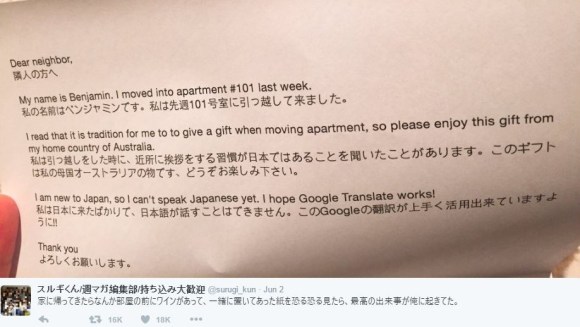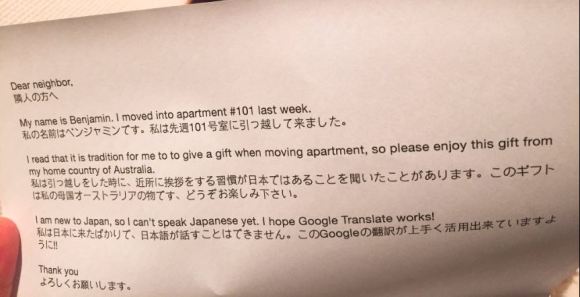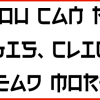
Always be mindful of what you write or let others write for you. You never know when it will be scrutinized by thousands upon thousands of Japanese people.
Living in Japan I often get asked to correct, tweak, or completely write out people’s emails, Facebook posts, or reports in English, and I always wonder if in doing so I’m actually doing them more harm than good.
Without a doubt I’m misrepresenting their actual language ability which could lead to future problems and whenever communication is done by proxy, we always run the risk of botched nuances and subtle but important differences.
One example, of how this kind of thing can go wrong went down on 3 June. Twitter user Surugi-kun came home to a puzzling scene: a bottle of wine standing on top of a folded piece of paper was waiting by the front door.

▼ “I came home and some wine was in front of my room, I carefully took out and looked at the paper it came with. It turned out to be the best thing!”
家に帰ってきたらなんか部屋の前にワインがあって、一緒に置いてあった紙を恐る恐る見たら、最高の出来事が俺に起きてた。 pic.twitter.com/XsK7wprThJ
— 漫画編集S (@sugiru__kun) June 2, 2016
On the letter was a bilingual message from Surugi-kun’s new neighbor who recently moved to Japan from Australia. Adhering to local customs, he kindly presented gifts to his fellow tenants.

Actually, he may have gone above and beyond as I have never given nor received a gift as nice as a bottle of wine (admittedly, I might have brought that karma on myself though). And while the gifts are supposed to be given along with a personal greeting, it seems everyone was willing to overlook that minor detail.
However, some Japanese Twitter users couldn’t overlook something peculiar about Benjamin’s note. The Japanese written in it is quite good. In fact, it was so good that people had a hard time believing either of Benjamin’s claims of not knowing Japanese or using Google Translate.
“There is no way that Japanese came from Google Translate.”
“Google would never translate ‘thank you’ as ‘yoroshiku.'”
“That Japanese is more fluent than the English.”
“This makes it even more suspicious that he didn’t show himself…”
“Maybe he used Excite Translate?”
“I bet you it’s just a Japanese guy who wanted to get the neighborhood all worked up.”
▼ “No doubt, this was not done by Google translate.”
https://twitter.com/tagoshu/status/738595013592907776Indeed as one comment pointed out, the letter closes with “yoroshiku onegaishimasu,” which does translate to a standard closing such as “thank you.” But Google Translate would never be able to identify it like that.
In addition, the last sentence of the note is crucial. First, it would be quite miraculous for an automatic program to translate one exclamation point (!) into two (!!), a punctuation favored in native Japanese typing. More importantly, the Japanese version of this line would translate back to English as “I hope this Google translation is coming out well!”
This is in contrast to Benjamin’s original sentiment of “I hope Google Translate works!” Which doesn’t include the key word “this” at all. It would seem our Aussie friend was not explicitly referencing his message but simply hoping Google Translate would get him through the beginning of his Japanese experience until his language skills improved.
And so we see the great Benjamin conspiracies of being a Japanese agent provocateur in the building are almost certainly incorrect and based on a slight mistranslation possibly done by one of Benjamin’s Japanese friends. However, the real lesson here is to avoid getting other people or machines to express yourself for you in another language.
You should always try it on your own as much as possible. And if you’re just beginning, limit the language you use to your own level with simple words and sentences. Sure you’ll sound like an infant with a concussion, but that’s an inevitable part of language learning. Much like a concussed child, you will get better with time and eventually be able to speak or write polite notes exactly the way you want to.
Source: Twitter/@surugi_kun via Hamusoku (Japanese)

 Japanese pronunciation of “……” in Google Translate gives us a laugh
Japanese pronunciation of “……” in Google Translate gives us a laugh “Good on the floor?” Five funny times Google Translate drops the ball with Japanese idioms
“Good on the floor?” Five funny times Google Translate drops the ball with Japanese idioms Japanese Twitter users make Osaka Metro’s English translation mistakes into running joke, memes
Japanese Twitter users make Osaka Metro’s English translation mistakes into running joke, memes “Supreme Court Beef” and other translation fails from the new Taco Bell Japan website
“Supreme Court Beef” and other translation fails from the new Taco Bell Japan website Does the Japanese word “natsukashii” exist in other languages? Japanese Twitter investigates
Does the Japanese word “natsukashii” exist in other languages? Japanese Twitter investigates Saitama is home to the best strawberries in Japan that you’ve probably never even heard of
Saitama is home to the best strawberries in Japan that you’ve probably never even heard of Cute coffins now available at Tokyo’s coffin relaxation salon[Photos]
Cute coffins now available at Tokyo’s coffin relaxation salon[Photos] Highest Starbucks in Japan set to open this spring in the Tokyo sky
Highest Starbucks in Japan set to open this spring in the Tokyo sky Family Mart’s Shibuya Cat Street shop hosts first-ever rescue cat photo exhibition for Cat Day
Family Mart’s Shibuya Cat Street shop hosts first-ever rescue cat photo exhibition for Cat Day Skyscraper sized Pokémon cards to appear in Tokyo all year long in Tocho projection mapping event
Skyscraper sized Pokémon cards to appear in Tokyo all year long in Tocho projection mapping event Man arrested in Japan after leaving car in coin parking lot for six years, racking up three-million-yen bill
Man arrested in Japan after leaving car in coin parking lot for six years, racking up three-million-yen bill Giant Clodsire Pokémon plushie comes with up to 32 Woopers in super size, super cute set【Pics】
Giant Clodsire Pokémon plushie comes with up to 32 Woopers in super size, super cute set【Pics】 Video claims that if you can read a certain font, you are probably not Japanese【Video】
Video claims that if you can read a certain font, you are probably not Japanese【Video】 Studio Ghibli Denies Live Action Adaptation of Kiki’s Delivery Service, We Dream Up Other Possible Ghibli Adaptations
Studio Ghibli Denies Live Action Adaptation of Kiki’s Delivery Service, We Dream Up Other Possible Ghibli Adaptations Japan has a special foil for roasting sweet potatoes at home, and it’s like having a time machine
Japan has a special foil for roasting sweet potatoes at home, and it’s like having a time machine The 10 most annoying things foreign tourists do on Japanese trains, according to locals
The 10 most annoying things foreign tourists do on Japanese trains, according to locals Starbucks Japan releases new sakura goods and drinkware for cherry blossom season 2026
Starbucks Japan releases new sakura goods and drinkware for cherry blossom season 2026 Naruto and Converse team up for new line of shinobi sneakers[Photos]
Naruto and Converse team up for new line of shinobi sneakers[Photos] Is Sapporio’s Snow Festival awesome enough to be worth visiting even if you hate the snow? [Pics]
Is Sapporio’s Snow Festival awesome enough to be worth visiting even if you hate the snow? [Pics] Japan has trams that say “sorry” while they ride around town…but why?
Japan has trams that say “sorry” while they ride around town…but why? Tokyo Skytree turns pink for the cherry blossom season
Tokyo Skytree turns pink for the cherry blossom season Sakura Totoro is here to get spring started early with adorable pouches and plushies
Sakura Totoro is here to get spring started early with adorable pouches and plushies Poop is in full bloom at the Unko Museums for cherry blossom season
Poop is in full bloom at the Unko Museums for cherry blossom season Shibuya Station’s Hachiko Gate and Yamanote Line stairway locations change next month
Shibuya Station’s Hachiko Gate and Yamanote Line stairway locations change next month Japan’s new “Cunte” contact lenses aren’t pronounced like you’re probably thinking they are
Japan’s new “Cunte” contact lenses aren’t pronounced like you’re probably thinking they are Japan’s newest Shinkansen has no seats…or passengers [Video]
Japan’s newest Shinkansen has no seats…or passengers [Video] Foreigners accounting for over 80 percent of off-course skiers needing rescue in Japan’s Hokkaido
Foreigners accounting for over 80 percent of off-course skiers needing rescue in Japan’s Hokkaido Super-salty pizza sends six kids to the hospital in Japan, linguistics blamed
Super-salty pizza sends six kids to the hospital in Japan, linguistics blamed Starbucks Japan unveils new sakura Frappuccino for cherry blossom season 2026
Starbucks Japan unveils new sakura Frappuccino for cherry blossom season 2026 Foreign tourists in Japan will get free Shinkansen tickets to promote regional tourism
Foreign tourists in Japan will get free Shinkansen tickets to promote regional tourism Take a trip to Japan’s Dododo Land, the most irritating place on Earth
Take a trip to Japan’s Dododo Land, the most irritating place on Earth Is China’s don’t-go-to-Japan warning affecting the lines at a popular Tokyo gyukatsu restaurant?
Is China’s don’t-go-to-Japan warning affecting the lines at a popular Tokyo gyukatsu restaurant? Survey asks foreign tourists what bothered them in Japan, more than half gave same answer
Survey asks foreign tourists what bothered them in Japan, more than half gave same answer Japan’s human washing machines will go on sale to general public, demos to be held in Tokyo
Japan’s human washing machines will go on sale to general public, demos to be held in Tokyo Starbucks Japan releases new drinkware and goods for Valentine’s Day
Starbucks Japan releases new drinkware and goods for Valentine’s Day We deeply regret going into this tunnel on our walk in the mountains of Japan
We deeply regret going into this tunnel on our walk in the mountains of Japan Studio Ghibli releases Kodama forest spirits from Princess Mononoke to light up your home
Studio Ghibli releases Kodama forest spirits from Princess Mononoke to light up your home Major Japanese hotel chain says reservations via overseas booking sites may not be valid
Major Japanese hotel chain says reservations via overseas booking sites may not be valid Put sesame oil in your coffee? Japanese maker says it’s the best way to start your day【Taste test】
Put sesame oil in your coffee? Japanese maker says it’s the best way to start your day【Taste test】 No more using real katana for tourism activities, Japan’s National Police Agency says
No more using real katana for tourism activities, Japan’s National Police Agency says Eight Japanese words we’d love to import into English
Eight Japanese words we’d love to import into English New app helps you translate Japanese and Chinese offline using smartphone camera
New app helps you translate Japanese and Chinese offline using smartphone camera The Japanese you learn at school vs the Japanese used in Japan【Video】
The Japanese you learn at school vs the Japanese used in Japan【Video】 High-tech glasses provide near-instant translation of Japanese text
High-tech glasses provide near-instant translation of Japanese text AI translation company Rozetta bans staff from speaking a foreign language at work
AI translation company Rozetta bans staff from speaking a foreign language at work U.S. college student learns the hard way to get your Japanese kanji tattoo checked by an expert
U.S. college student learns the hard way to get your Japanese kanji tattoo checked by an expert Translation debate: how do you say “oh my God!” in Japanese? Netizens have many different answers
Translation debate: how do you say “oh my God!” in Japanese? Netizens have many different answers Kyoto study finds nearly 500 translation errors for foreign tourists, new guidelines released
Kyoto study finds nearly 500 translation errors for foreign tourists, new guidelines released Five magic Japanese phrases to know before starting a job in Japan
Five magic Japanese phrases to know before starting a job in Japan Japan Association of Translators condemns A.I. manga translation
Japan Association of Translators condemns A.I. manga translation Japanese Twitter reveals the one Japanese word that gets English-speakers super excited
Japanese Twitter reveals the one Japanese word that gets English-speakers super excited Costco Japan wants all English speakers to know they’re holding a “Tuna Roadshow”
Costco Japan wants all English speakers to know they’re holding a “Tuna Roadshow” W.T.F. Japan: Top 5 most perfectly translated Pokémon names【Weird Top Five】
W.T.F. Japan: Top 5 most perfectly translated Pokémon names【Weird Top Five】 The curious case of the pickled radish bread from Shiga Prefecture known as takuan pan
The curious case of the pickled radish bread from Shiga Prefecture known as takuan pan